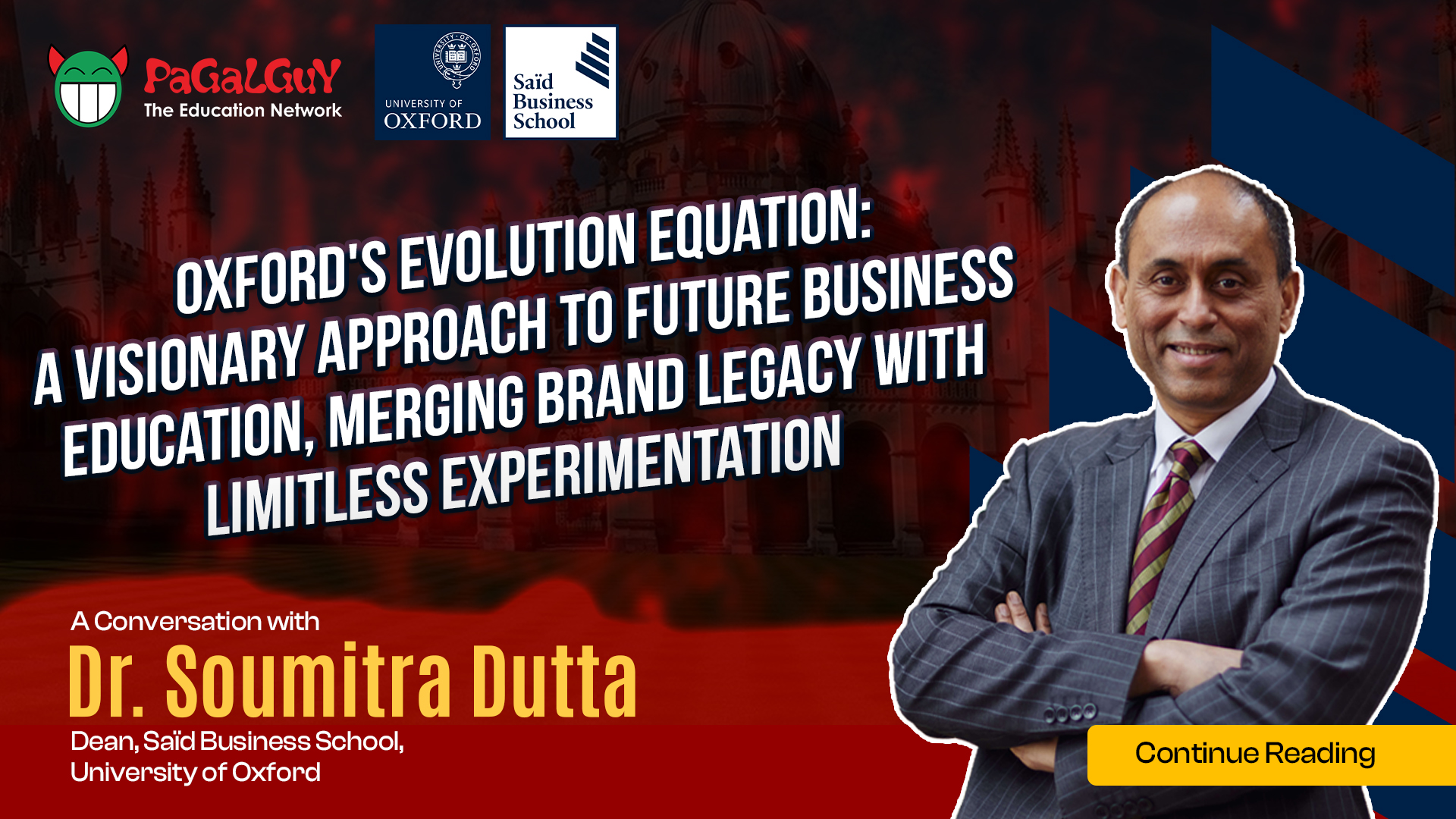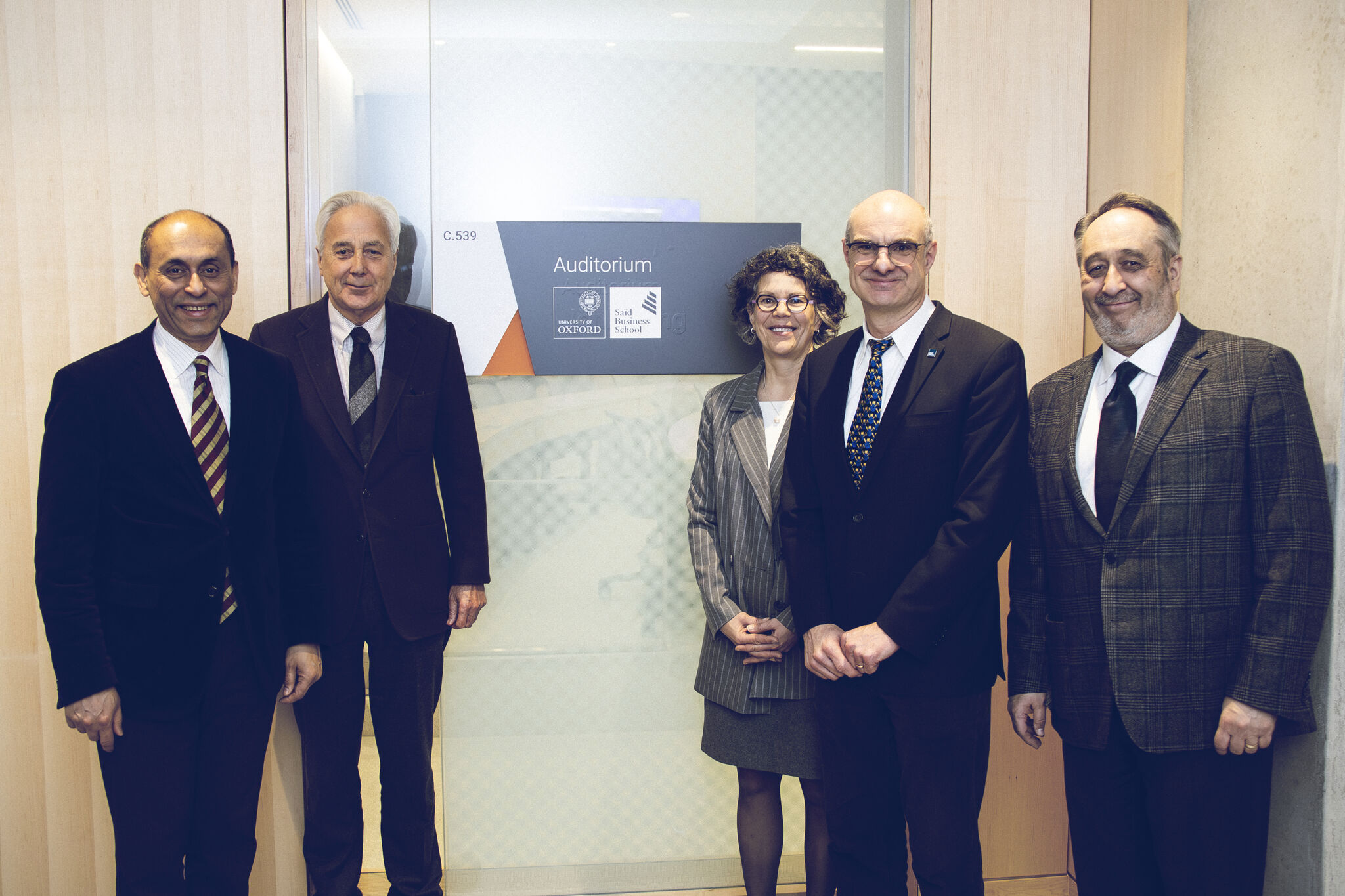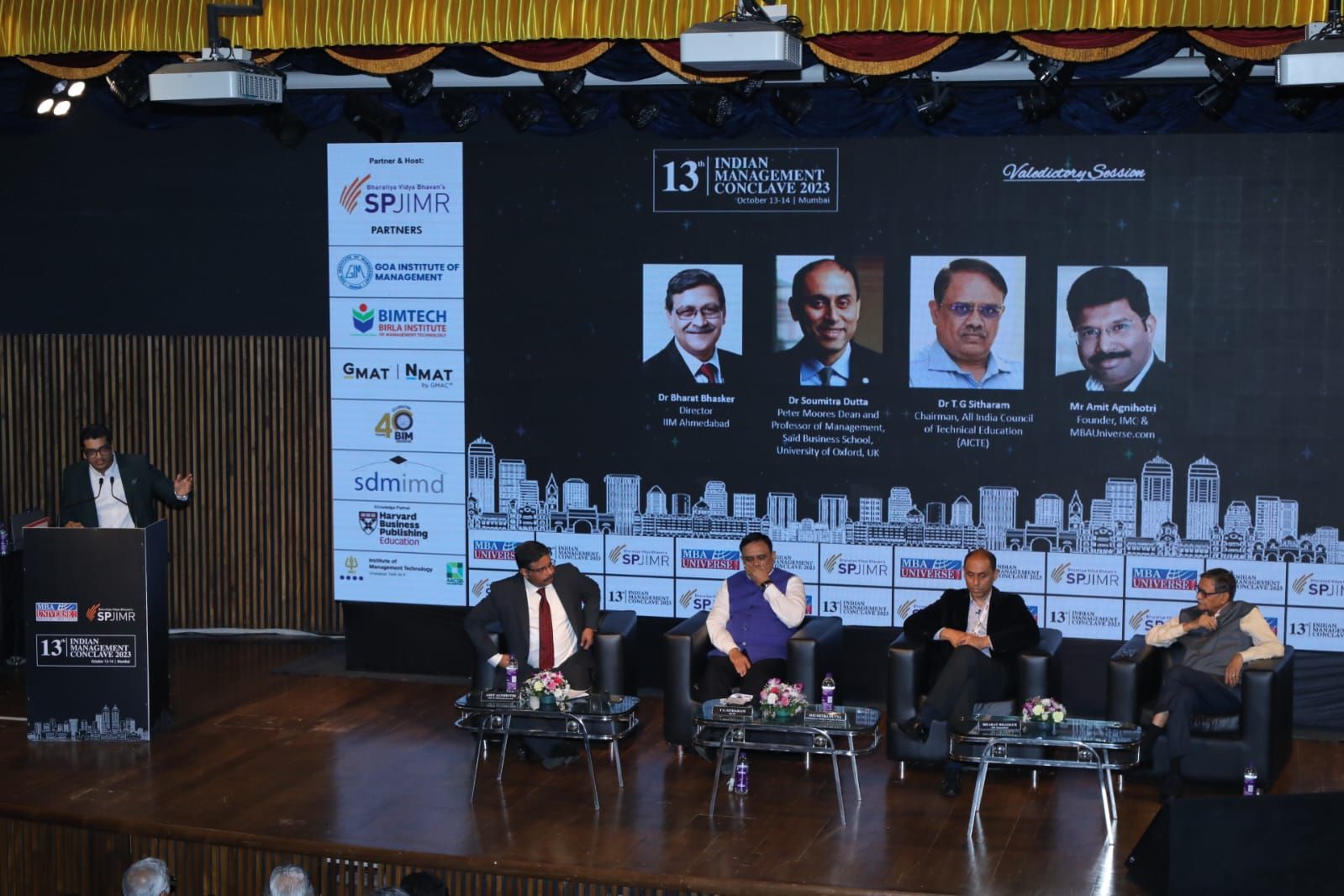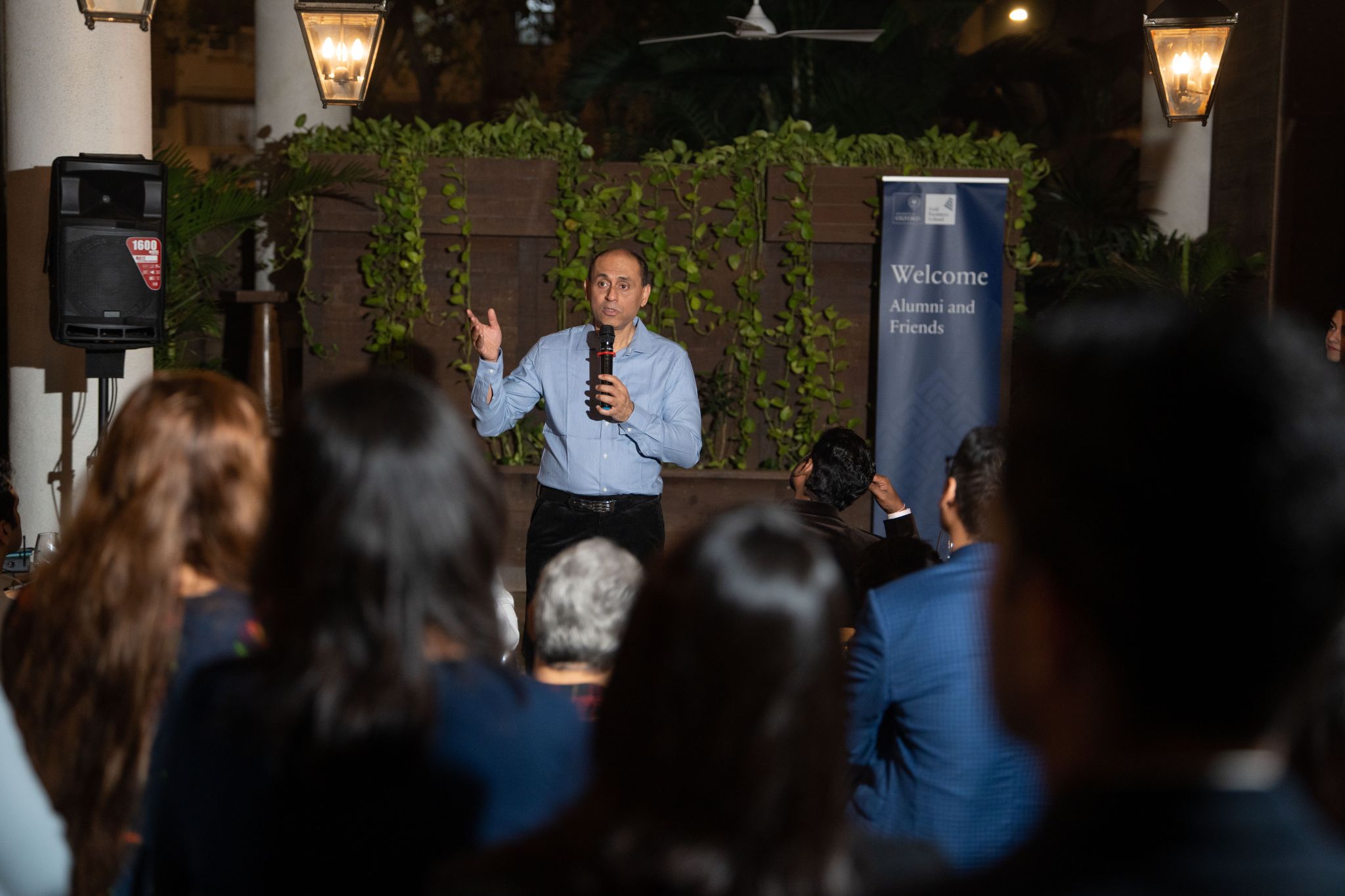
In our latest interview series, “#GlobalThoughtLeaders – B-School Edition,” we had the pleasure of chatting with Dr. Soumitra Dutta, the Dean of Saïd Business School. Our conversation delved into the significance of MBA education in 2023, exploring the rich legacy of Oxford in molding Saïd Business School into a research-oriented institute known for its innovative teaching methods. Dr. Dutta also shares his insightful perspective on the interplay between ambition and sustainability. For a deeper understanding, feel free to check out the complete interview for more valuable insights.
In this compelling interview, we will delve into the remarkable journey and visionary insights of Dr. Soumitra Dutta, Dean of Saïd Business School at the University of Oxford. With an esteemed academic background that encompasses IIT Delhi and a PhD from UC Berkeley in computer science, Dr. Dutta’s transition to leading a business school stands as a testament to the evolving landscape of technology in education. We explore his unique perspective on the fusion of computer science and business education, a blend now imperative in this age of rapid technological advancements. Dr. Dutta shares his vision for Saïd Business School, addressing the profound shifts in technology and data science and the pivotal role it plays in transforming the world and education at large. Join us as we venture into the future of business education, shaped by the inexorable rise of technology and the conscientious leadership steering the transformation.
To access the full interview visit out YouTube Channel – Subscribe Now.
Q1. Your educational path from IIT Delhi to a computer science PhD at UC Berkeley is intriguing. What prompted a computer science expert to lead a business school? We are keen to hear your perspective on why you’re the right fit for heading a management education institution with such a unique background.
My personal journey from computer science to business is one of those serendipitous moments that redirects your life unexpectedly. To be completely honest, I never intended to enter a business school; my academic focus was in computer science at Berkeley. However, life has a way of introducing influential people, and in my case, it was my future wife. She was on a Fulbright Scholarship that required her to return to Europe, leading me to contemplate my post-graduation plans—whether to stay separated for two years or join her in Europe. Complicating matters, we had a young baby at the time, who is now considerably older.
The tough decision for me was to seek employment in Europe. By pure accident and coincidence, I ended up landing a job at a business school at INSEAD. Initially planning to stay for two years, those two years turned into 22. Subsequently, I transitioned to Cornell for another 11 years before finding myself at Oxford today. My journey has taken me across continents, oscillating between computer science and business.
What’s intriguing is the question you posed: What are computer scientists doing in a business school? Today, the answer is evident, as technology plays a transformative role in almost every sector. However, it’s essential to recall that 33 years ago, when I initially entered a business school, people questioned my presence, suggesting I should be in a computer science department, as computers were considered non-strategic in the business realm. Life has evolved, and now technology is at the core of business education and the business landscape. I believe I’ve found myself in the right place at the right time.
Q2. In the age of AI and accessible technology, do you see your role as the ideal leader for the business school in light of these tech shifts, and what’s your vision for the school?
I believe it’s crucial for all of us to maintain perspective on the fact that technology is advancing exponentially. While an exponential curve may not seem drastically different from a linear one for an extended period, there comes a tipping point when the curve takes on a hockey stick shape and shoots upward. Moore’s Law, in effect since the early sixties, has been active for about 65 years, and instead of slowing down, it’s actually accelerating. With the advent of quantum computing, this acceleration is set to increase even further. It’s important to recognise that we are currently in the hockey stick phase of this technological shift, implying that the progress we’ve witnessed in the last ten years is minimal compared to what we can expect in the next decade.
This acceleration is particularly evident in the field of AI, where substantial changes have occurred in the last five or six years. The concept of large language models (LLMs) is relatively recent, around five years old. The power of technology is rapidly and dramatically increasing, especially in the context of education, where it is fundamentally transforming the landscape. The significant question facing us at a business school the size of Oxford and all business schools alike is our readiness for this transformation.
Taking the example of AI, it has the potential to infiltrate every aspect of a business school. Teaching about AI becomes essential, as students entering the workforce will need to utilise AI in their professional settings. Furthermore, we must consider how AI can streamline our operations and facilitate different approaches to tasks. AI can provide guidance to students regarding programme selection, career choices, and academic advising. Pushing the boundaries further, AI could potentially take over tutoring in subjects that haven’t reached the point of generating entirely new knowledge. While AI has the capacity to assume many functions within a business school or university, it raises a fundamental question for leaders like myself: how do we thoughtfully integrate our human talent—students, staff, and faculty—with this increasingly intelligent technology?
As a dean of a business school, I acknowledge that we currently lack all the answers, but it is the direction in which we are heading. We need to be more strategic and intentional in combining the strengths of human beings with the capabilities of intelligent technology within the business school context.
Q3. In the midst of global transformation, is the legacy of a historic institution like Oxford, while advantageous for MBA aspirants, a potential drawback when leading technological transformations in an MBA programme?
On the whole, if I were to make a broad statement, having a leading global brand like Oxford behind you is immensely beneficial. Essentially, it elevates the potential achievements and facilitates the kind of experimentation required to create the future. Establishing partnerships and close relationships with companies becomes much more accessible, as they are more willing to collaborate in shaping the future with an established brand. The reality is that Oxford, like other leading American schools, doesn’t possess the full answer for the future of education or the business model. Thus, the future needs to be co-created with corporations, international organisations, and society at large. A strong brand simplifies and amplifies the impact of the experimentation process.
Now, what truly matters is the degree of willingness of the leadership and the organisation to experiment, adapt, and embrace change. It’s not just about the historical legacy but more about the leadership within the organisation. Institutions like Oxford have thrived for a thousand years because they’ve demonstrated the ability to adapt to technological and geopolitical shifts. Survival and thriving in change are inherent strengths, reflecting the well-organised system and ethos of the institution. Contrastingly, many companies in indices like the S&P 500 face high turnover due to their inability to adapt quickly.
However, the critical factor remains the courage of the leader to explore new avenues. Take assessment, for instance—it’s a fundamental aspect of every business school and organisation. With technologies like Chat GPT becoming more prevalent, the entire assessment process needs rethinking. To embark on such a transformation, courage, experimentation, and a willingness to try different approaches are essential. The COVID-19 pandemic highlighted how societies adapted to different models of evaluation, demonstrating that experimentation and the evolution of solutions are not only possible but necessary.
In considering the integration of modern technology with traditional education, the approach varies. Some schools embrace tools like GPT as a fundamental way of recognising the need for innovation. On the flip side, there are schools cautioning against the use of such technologies, fearing potential repercussions if their use is discovered. The key lies in finding a balance that aligns with the institution’s values while also embracing the transformative potential of technology in education.
Q4. How do business schools blend traditional management concepts with innovation and technology, incorporating methodologies such as LMM or CHATGPT, to prepare students for industry demands and future challenges?
I believe that Chat GPT represents just one facet of the technological shift influencing business schools. Regarding the Chat GPT dilemma, I am of the opinion that there is no alternative but to embrace it. Any school choosing not to do so is doing itself a disservice because students are already utilising it, and imposing restrictions on access is impractical. Instead, the emphasis should be on educating students on how to effectively utilise Chat GPT. It’s comparable to teaching them how to navigate online news efficiently and discern between fake and real news. These educational components need integration not only for students but especially for faculty members, who might be somewhat behind on the learning curve in various technological aspects.
Technology is fundamentally reshaping the identity of a school. As the dean of a school, my primary budget allocations are directed towards people, primarily faculty and staff, followed by buildings and other essential services. When considering how technology impacts the business model, it challenges fundamental assumptions about the required number and type of personnel, the necessity of physical buildings, and the mode of education distribution. These are significant questions, and the answers may vary among different schools. I’m not asserting that every school will arrive at the same conclusion, but each institution needs to experiment with diverse options and make choices aligned with what they believe is right for them.
Q5. Do you anticipate significant technological changes being implemented at Oxford in the upcoming years? What are the current concepts and ideas under consideration?
I’ve been part of Said for over a year now, and it took me a good six months to truly grasp the intricacies of Oxford—a vast, complex, and historic university. Today, I feel confident in the understanding of our objectives and the direction we’re heading. The core strength of Oxford lies in its excellence in research and the generation of innovative ideas. Consequently, our primary focus is to increase investments in research and the development of original concepts, which I believe is at the heart of our academic mission.
This emphasis on research implies the need to expand our faculty, particularly in research roles, and establish more effective collaborations with other university departments. For instance, in areas like climate studies, where we lack scientific expertise, we must collaborate across disciplines to address complex phenomena more efficiently. Research stands as the foremost criterion for investing in our people.
The second major initiative involves enhancing our technological infrastructure and capabilities. While we already have a strong IT department managing various functions, we recognise the necessity of strategic technical capabilities that impact the forefront of education. In the past six months, we established Oxford Side Online, an internal Edtech unit. Its purpose extends beyond creating asynchronous and synchronous educational materials—it aims to build expertise in technology frontier areas, allowing us to experiment with AI, implement ChatGPT and similar language models, delve into NFTs, and explore their application in our product distribution portfolio.
Infrastructure development is another priority, acknowledging the physical nature of today’s world—a fusion of the physical and digital. We are investing in a new mini-campus dedicated to executive learning, not only focusing on constructing a state-of-the-art building but also incorporating the latest infrastructure and pedagogical approaches. A new space allows us to reconsider the entire learning process.
At a broader level, we are embracing a global perspective, recognising that despite global tensions, a global approach is imperative. Already boasting a highly diverse student body, with 95% coming from outside the UK, we aspire to further globalise our reach. These are the overarching directions we are taking, but of course, there are additional initiatives underway to propel our institution forward.
Q6. We are seeing leading universities transitioning from simulation to AI-powered simulations for better course engagement and more immersive experience; what specific areas do you consider promising for investment?
So, I believe simulations are a broad category of learning that has been around for quite some time. I consider simulations to include various forms, such as board games, paper games, paper-based simulations, and computer-based simulations. Additionally, one can extend this to include meta-verse-based simulations and other more complex forms. For me, simulations represent a mode of learning that is experiential.
In my perspective, technology is currently enhancing the experiential nature of learning. This has been evident, especially in the context of the COVID environment. With restrictions on physical travel, people have innovated by organising virtual plant tours and visits to foreign locations. It allows individuals to experience a planned tour from the comfort of their classrooms, providing insights into activities in a factory located far away.
Moreover, technology facilitates effective connections between people from different cultures and countries through various learning approaches, including simulations. This, in turn, contributes to a much richer learning experience for students. I believe that the category of experiential learning, including simulations, will continue to evolve and become more widely utilised.
Currently, many schools are investing in this area, recognising its significance. However, I think the more fundamental questions revolve around resource allocation. Specifically, how much are we allocating to people, building infrastructure, and innovative new technology? This consideration is crucial for ensuring the effective integration and sustainability of experiential learning in the broader educational landscape.
Q7. As the saying goes, you can figure out a man’s interest based on what he spends on. That’s true for companies and large organisations, so spending on professors still forms the biggest part of every institution’s budget. Do you expect any significant changes in them in the years going forward?
Certainly. As I mentioned in my previous response, we are committed to doubling down and investing in professorial research talent that can contribute to the generation of new ideas. Personally, I believe that the distinguishing factor for human experts, individuals, and top universities lies in the quality of their research endeavors. For instance, when you attended Wharton, I’m certain that something about Wharton’s research must have appealed to you. While alumni networks are undeniably important, the true greatness of a university or institution is rooted in the excellence of its research.
This principle holds true for Oxford as well. I am involved in the production of the Global Innovation Index, wherein we assess the innovation rankings of various regions worldwide. Recently, we released the ranking of the top science and technology clusters globally, with Cambridge, San Jose, and Oxford occupying the top three positions. This underscores the significance of these areas, primarily driven by the excellence of the institutions associated with them.
Being at Oxford, it is imperative for us to continue investing in top-quality human talent capable of generating innovative ideas. Naturally, we hope that such investments in faculty also attract the brightest students. The idea is that when the best students come here, they are inspired, educated, and equipped to go out into the world and, in turn, make a positive impact—much like you are influencing and changing the world in your own way.
In regions like India and beyond, our goal is for our students to leave, make a difference, and contribute positively to the world around them. This cycle of investing in people, attracting the best students, and ultimately fostering positive change is something we are committed to continuing at Oxford, and I believe it holds true for other top institutions as well.

Q8. Having served as the vice chair and chairman of AACSB International, you have had valuable insights into the happenings in the US. What challenges do you perceive the US facing? Now, with your transition to Europe, what notable differences do you observe, and what aspects do you find compelling for potential adaptation or adoption?
So, I’ve had the privilege of working in the US and studying there for many years. Despite its flaws, I love the country. What I find particularly appealing about the US is the sense of ambition it instils—a crucial aspect, in my opinion. There’s a profound feeling of hope that one can achieve remarkable things and amass significant wealth. I’m not passing judgement on whether being rich is good or bad or delving into discussions about inequality and salaries. Instead, I emphasise the importance of ambition, pushing beyond one’s perceived limits, which, I believe, defines human beings to a certain extent. The US excels at fostering this sense of ambition, but not everyone achieves the same level of success and many face setbacks. However, the belief persists that with enough effort or a bit more trying, success is attainable.
In Europe, the dynamic is somewhat different. While there is still an evident sense of ambition, the focus leans more towards making the world a better place. At higher levels, the emphasis is on ensuring the planet’s sustainability and improving the quality of life for all. Personal ambitions exist, but they are subordinate to societal and planetary well-being. This distinction in cultural values between the US and Europe is crucial and influences the ethos of students.
In terms of global perspective, Europe naturally exhibits more global awareness, attracting individuals with a broader worldview. Conversely, the US tends to be more US-centric, as you likely observed during your own education. The dominance of US-centric discussions and perspectives in classrooms is a consequence of the country’s influential economy.
An interesting trend I’ve observed in the US over the past decade is the increasing allure of technology. About 20 to 30 years ago, being a tech professional wasn’t considered particularly attractive. However, the success of numerous tech entrepreneurs has elevated the status of being a software expert, making it a highly esteemed career choice. This level of appeal for technology is not yet as prominent in Europe, partly because the region lacks the mega success stories of tech entrepreneurs seen in the US, China, and to some extent, India.
Additionally, in the US, there seems to be a prevalent model of prioritising personal success first and then contributing to societal and environmental causes. The mindset often revolves around making the first billion and then giving back. In Europe, the approach is somewhat different, with individuals considering making a more modest amount while ensuring environmental sustainability. This distinction underscores a unique aspect of the US approach to success and philanthropy.

Q9. In the process of providing courses at Said School, what criteria do you consider in a candidate? Are you specifically seeking traits like ambition?
Yeah, I consider myself fortunate in that regard because the decisions aren’t made by me but by those who came before me. So, I believe Oxford, particularly the Said Business School, being established within Oxford University, carries the societal impact and the betterment of the world in its essence, reflecting the university’s ethos. For instance, take the creation of the vaccine; it exemplifies two significant aspects. Firstly, Oxford was the sole university globally to develop a vaccine, showcasing the profound research conducted. Creating a vaccine isn’t a spur-of-the-moment decision; it requires extensive research, and Oxford’s depth of research is evident.
Secondly, the university partnered with AstraZeneca under the condition that the vaccine would be distributed at cost in emerging markets. This decision may have resulted in the loss of significant royalties, possibly in the tens or hundreds of millions, but it’s a conscious choice aimed at saving lives. This decision reflects the university’s ethos, a stark contrast to potential alternatives where other universities might prioritise financial gains. This ethos is ingrained in the DNA of the Said Business School.
I would say that the Said Business School made a deliberate choice about 30 years ago to prioritise impact and the well-being of society, a time when such considerations were not commonplace in business schools. While many schools now aspire to follow suit, the Said Business School, with its roots in Oxford’s history and DNA, stands out as more credible and authentic in its commitment to impact. This orientation towards making a positive difference is evident in various aspects of our work.
For instance, our approach to family businesses goes beyond the conventional teachings of managing and running a family business. We have a distinct focus on what we term “impact through family wealth.” In other words, we explore how family businesses can utilise their wealth to contribute positively to the world. This approach is exemplified in projects like the Ownership Project 2.0, which emphasises deploying family wealth to create a meaningful impact on a broader scale. This kind of perspective sets Oxford apart, making our initiatives more impact-oriented and geared towards contributing to the greater good.
Q10. In your perspective, what criteria define success, whether on a personal or professional scale?
Personally, I believe success can be measured in various dimensions—both in my personal life and in my professional endeavours. From a professional standpoint, the success of our students is a direct reflection of my own success. Witnessing our graduates excel in their pursuits, feeling empowered and well-prepared to make a positive impact on the world, is the ultimate gauge of success for me. On a professional level, my contributions, such as my research on global innovation, which is now utilised by over 110 countries, give me a sense of satisfaction. Knowing that I can influence the direction of innovation policies in countries like India through initiatives such as the Indian Innovation Index is a meaningful measure of my impact on the world.
On a personal level, achieving a good, happy, and healthy life is equally important.

Q11. Are you currently exploring partnerships or collaborations with Indian business schools, or do you view them as a potential growth area for Oxford University?
In terms of potential collaborations with Indian business schools, it’s worth mentioning that we’re already working closely with several Indian schools on an individual basis. However, establishing significant institutional partnerships comes with its own set of challenges. The strong historical ties between India and Oxford, along with the unique collegiate system here, somewhat limit the depth of institutional collaborations we can offer.
Nevertheless, I’m actively engaging with various universities in India, exploring different levels of collaboration and engagement. My goal is to foster partnerships that contribute to the growth and development of education and innovation on both ends.
Q12. In the process of admitting an MBA candidate, what are the key factors that Said Business School emphasises when evaluating applicants? Can you describe the typical profile of an Oxford MBA aspirant?
First and foremost, I must emphasise that there isn’t a typical MBA applicant, making it challenging to establish a standard profile. However, what we seek is a diversity of backgrounds. We are interested in individuals like the technology software engineer who has excelled in their field, the music student aspiring to understand the business side of music development, and those who have established social entrepreneurship ventures contributing to societal good.
In my team, our focus is on building and enhancing diversity. This means considering applicants with unconventional paths, including those without traditional degrees. Recently, an executive MBA student shared his success story with me – having battled heroin addiction for two decades, he went on to establish a successful small car business. This individual is now graduating after completing the executive MBA and starting an entirely new career.
We aim to attract the best and brightest minds with various life experiences. However, certain commonalities exist among our students. Firstly, they all share a strong desire to learn. Without this eagerness for continuous learning, success in the programme is unlikely. Secondly, they possess a foundational level of intelligence, including emotional intelligence (EQ) and intellectual intelligence (IQ), crucial for navigating the coursework.
Equally important is their commitment to doing good, both for themselves and the world. While each student’s vision for making a positive impact varies, the overarching desire to contribute is fundamental. We hope to play a role in inspiring our students to surpass their own expectations, evolving into individuals who make a difference.
In conclusion, what we hope to achieve is attracting bright minds with diverse experiences, inspiring them to be the best version of themselves and contribute positively to the world. I want to express my gratitude for the invitation, and I encourage everyone listening or watching to seriously consider Oxford Business School. It is a unique institution offering not only exceptional business education but also a transformative experience that goes beyond the conventional business school model – that’s the Oxford touch.

Thank you, dear readers, for your incredible support and enthusiasm for this interview. We’re thrilled to have you engaged on PG, and there’s more exciting content coming your way. Be sure to stay active on our platform for more captivating reads, and don’t forget to check out our recent articles here. Happy reading!
